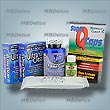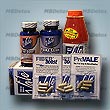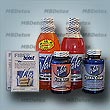-
October 7th, 2010
Drug Detoxification
Related products:
-

Complete Critical Cleaning Package
In today’s job market, drug testing can be a mysterious intrusion. Pre-employment drug screens and random …
Buy now
$141.99 -

2 Month Extensive Cleansing Program (Extra Strong)
The Two Month Extra Strong Extensive Cleansing Program provides gradual permanent cleaning with two daily …
Buy now
$109.99 -

2 Month Extensive Cleansing Program (Regular)
The Two Month Extensive Cleansing Program provides gradual permanent cleaning with two daily supplements …
Buy now
$99.99
Drug Detoxification
Drug detoxification refers to the collective of processes aimed at eliminating addictive substances from the body of the patient. The patient referred to here is the user of the drug and in most cases is addicted to it. Total elimination of the traces of the drug is of paramount importance since any residue of drug, not removed from the body can cause a further craving for the same by the patient. Therefore the ultimate aim of detoxification is to lessen the physical effects caused by the use of the drug and eliminate the patient’s craving for the drug. It can also help you pass drug tests including cocaine tests.
A complete detoxification program should include treatment of other aspects of the problem as well. These include the psychological dimension of addiction, other complex behavioral issues connected with addiction and social factors and effects of addiction. This is because drugs usually affect the central nervous system thereby promoting addiction. Therefore addiction is as much a physical problem as it is a psychological one. Social effects like violent behavior after drug consumption, robberies for getting money to procure drugs, rivalry between different drug gangs causing gang wars etc. also form a part of the complex phenomenon of drug addiction. The issue therefore demands a comprehensive approach for its solution.
A typical detoxification program consists of three parts:
Evaluation: in this first part the patient is analyzed for which drugs he is addicted to. Blood, urine etc. tests are conducted to evaluate which drug(s) is circulating in his system. Other connected evaluations include checking the patient for possible co-occurring disorders, mental or behavioral issues and dual diagnosis.
Stabilization: in this the patient is systematically explained what the process of detoxification actually involves. This part of detox is usually conducted with medicine, although the same can also be done without medicines. Family members or other close relations of the patient are also roped in this process, as the patient requires psychological support.
Guiding patient into treatment: is the last stage of the detox process involving readying the patient for the actual recovery process. The patient is required to give his assent for enrolling into the rehabilitation program where he is gradually made to give up the habit.
-
Need to pass a drug test ? That's the best website
Face your Drug Test with Confidence
24/7 toll free call line (866) 600-0032
Did not find the information you need? Search the similar articles: